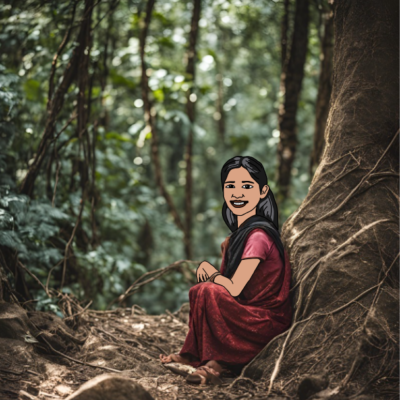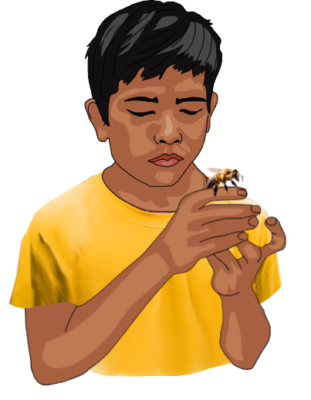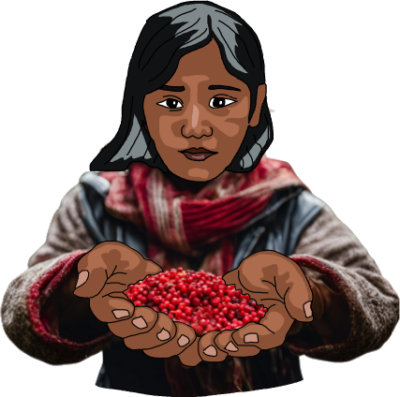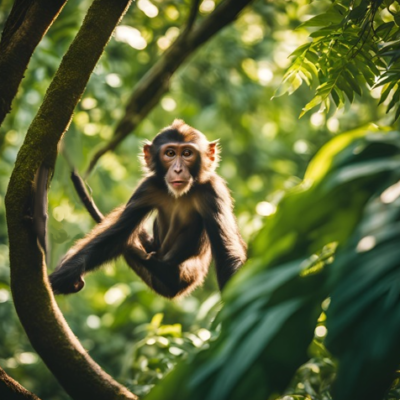P2W9: Emergency Preparedness
backDear Diary,
It’s me, Tara, writing after another adventurous day in the forest. Living in our little village nestled in the mountains of Nepal, I’ve always loved the forest. It feels like home, peaceful, mysterious, and full of treasures if you know where to look. I usually go alone, but today, a couple of friends came with me because they wanted to learn how to forage. Let’s just say it was a day to remember.

We started early to avoid the midday heat. I reminded everyone to wear long sleeves and pants, but of course, Manish showed up in a bright yellow t-shirt. “The bees will think you’re a flower,” I joked. He laughed until he got too close to a hive hidden in a tree. A bee stung him on the arm, and he panicked.
 |
I calmed him down, as panic makes stings worse. Scraped the stinger off gently with a flat rock (don’t pinch it!). Then I applied a cool, damp cloth from my kit to reduce swelling. |
| I explained: “Bees only sting once, but wasps can sting multiple times. So, next time, stick to the path and avoid bright colors.” He grumbled, but I think he learned his lesson. | - |
Side note Preventive Tips:
|
While I was collecting wild garlic and fiddlehead ferns, Mina wandered off.
 |
She came back holding a handful of shiny red berries, looking so proud of herself. “Are these edible?” she asked. My heart nearly stopped. I told her firmly: “Never eat anything from the forest unless you’re 100% sure it’s safe.” I checked the berries carefully. They were toxic nightshades. |
| I told everyone: “Wild plants with milky sap are often poisonous, and shiny berries are usually a warning sign.” They nodded like they understood, but I think I’ll need to remind them next time. | - |
Side note Emergency Checklist for Poisoning:
|
After lunch, the forest got quieter, but I stayed alert. I’ve seen what can go wrong out here, and I wasn’t taking any chances.
Manish started feeling dizzy, so I gave him water and a salty snack. “Sip slowly,” I said. “We don’t want you fainting on the trail.”
I noticed Mina wandering too far ahead. “Stick with the group!” I shouted. "The forest can be disorienting if you don’t know the landmarks."
A rustling sound startled everyone, but it was just a monkey in the trees. I reminded them: “Never approach or feed animals. We’re visitors in their home.”
 |
- |
Side note Potential Sources of Danger in the Forest:
|
By the time we got back, everyone was exhausted. Manish’s sting was better, Mina didn’t eat the berries, and nobody got lost or hurt. I told them: “The forest is beautiful, but it’s not forgiving. Respect it, and it’ll provide; take risks, and you’ll regret it.”
I love sharing my knowledge of the forest—it’s my way of protecting it and my friends. But next time, I think I will make everyone pass a "Forest 101" quiz before they come with me!
Goodnight, Diary.
Tara
- Have you ever been stung by an insect like a bee? How did you handle it, and what could you do differently next time?
- What steps do you take to avoid insect bites when you’re outdoors?
- Why do you think wearing the right clothes and using repellent is important in nature?
- Have you ever seen or picked mushrooms or berries in the wild? How did you know they were safe to eat?
- What would you do if you or a friend accidentally ate a poisonous plant?
- What would you do if you or someone else got lost in the forest?
- Have you ever encountered a wild animal? How did you react, and what advice would you give others about staying safe around animals?
- What do you think is the most important item to have in a forest survival kit, and why?
- How do you think Tara’s knowledge of the forest helped her keep her friends safe?
- Do you enjoy exploring nature? What have you learned from your own outdoor experiences?
